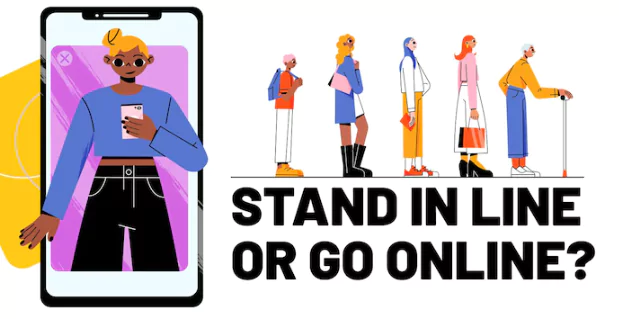If you’re intending to give your company or organization an online presence, one of the first questions that will probably cross your mind is Web App or Website: Which is better? And even sometimes you must be wondering, Should I choose only one of them or both? The best option for your needs will depend on a number of factors, including target audiences, available budget, intended purpose, and required features. Mobile websites and apps can initially appear very similar. In this blog, we will dig deeper into the debate that Web App vs Website: Which is better
An end user often finds it challenging to distinguish between a web app and a website. Once they enter the URL, the results appear instantly.
However, it is up to you, the developer, to create these items for the user. So, you should be well-versed in their distinctions. Do you understand what distinguishes a website from a web application?
We’ll use a straightforward technological strategy in this post. I’ll try to highlight some of the most significant distinctions that helped me grasp how websites and web apps vary.
Table of Contents
What is a Website?
A website is a collection of openly viewable pages including documents, photos, audio, text, or other things that internet users can access.
Several pages or only one page might make up a website. A URL must be typed into the search box of the user’s web browser in order to access a website. An example of a website URL is https://thecolourmoon.com/
Websites usually come with two different designs. The following are the two categories of website designs:
Dynamic Web Design
These are more complicated and involve user interactions on the back end. Along with the unique HTML, CSS, and JavaScript, they also use more sophisticated languages and databases. They don’t display static content; instead, they change it based on a number of variables.
Static Website Design
Simple programming languages like HTML, CSS, and JavaScript are used to create these. Because there is no user-interactive database, they are referred to as static. Every user that accesses them sees identical content.
Characteristics Of Websites
One of your main responsibilities as a developer will be to design user-friendly websites. This is so because websites are primarily evaluated based on their appearance. How long a person will stay on your site is largely influenced by its design.
The following characteristics will help you create a stunning website:
- It should be user-friendly so that visitors can quickly understand what the site does.
- It should contain high-quality content.
- It should be appealing. You should be able to give your website a professional look.
- It should be simple to navigate.
- It should load instantly.
- It should be responsive. Make sure all devices can access your website. Remember that most users use their smartphones rather than PCs.
Why Do You Need a Website?
A website helps market a business online and helps build credibility. There are several reasons why a website is important for your business, let us look at some of the main reasons.
A website will enable you to expose your products to anyone with an internet connection, wherever you own a business.
- It will support the development of your personal or business brand. which helps build credibility.
- It helps establish an internet presence so that potential customers can find you quickly.
- It can be used to generate cash through monetization and advertising. All done with a website.
What is a Web Application?
A Web Application is an interactive user interface used by a software system to carry out tasks. The software applications are run through an internet-based web browser or through W3C(World Wide Web Consortium) web technologies and standards.
The web application is not the same as computer-based software programs that are run on a device’s operating system because it is hosted on a web server.

Web apps can do a wide range of things, including creating, reading, updating, and deleting data in the app. They are also highly customizable. They require a skilled team of developers to produce because they are more sophisticated and challenging.
Characteristics of a Web Application
Let’s look at some important characteristics of web applications:
- Any common web application can be executed or accessed on any operating system.
- An online program typically does not need to be installed on the computer’s hard drive, which solves all the space-related problems.
- Since everyone has access to the same version of the online application, there are no compatibility problems.
- Additionally, it lessens software piracy in web programs that require subscriptions, like SAAS (or Software as a service).
- Because the business requires far less upkeep, they also lower costs for end consumers and business owners.
- Web apps can be customized. As long as he has a functional internet connection, a user can work from any location.
- By giving a username, password, and URL, creating a new user only needs a little amount of time.
- As long as you have the money, storage capacity is now practically limitless thanks to the cloud.
- In contrast to native programs, which can only run on a certain platform, a web application can be developed to function on a range of operating systems.
- Basic programming languages like HTML and CSS that are compatible and well-known among IT professionals are used to create any standard online application.
Why You Need a Web Application
A website offers a wide variety of benefits for small businesses, and most of these benefits increase in value exponentially year over year, just like the Internet itself. Not convinced? We’ve collected a few of the biggest benefits your small business can receive from even a simple website
Improved Efficiency: Aside from being time-consuming, managing various spreadsheets or stacks of papers might expose your company to mistakes made by employees that are difficult to detect until it is too late.
In addition, without integration between these various sources of data, data replication may be necessary in order to provide a comprehensive picture of business performance.
24×7 Accessibility: Web-based business systems developed by web applications can be accessed around the clock as long as you have an internet connection. Additionally, they provide access from virtually any device or browser and are completely flexible
Higher Levels of Security: When using desktop-based software, a stolen or damaged computer may be highly expensive and time-consuming, putting your data at danger and necessitating that you get in touch with the software’s developer and ask for the software to be re-installed on a new device.
Easy Customizable and Scalable: With off-the-shelf software, one of the major issues that clients come to us with is that it cannot expand or integrate with their business, at least not without pricey updates.
Easy Installation and Maintenance: By using a web application, you can avoid the inconvenience and memory requirements of installing software on each device. Web applications are also less demanding on older or low-spec devices.
Web App vs Website: Which is Better
You could be unsure of the precise distinction between a web application and a website when making your decision. There can appear to be no difference at all at one moment. The definitions are debatable, and they occasionally overlap. It is not an easy comparison between a Web App vs Website: Which is Better? Both websites and web applications use the same programming languages for their front end and back end, run in browsers and require internet access. Additionally, they both have qualities like integration, authentication, and interactivity.

However, we still think that the distinction between a website and a web application should be understood explicitly when looking for an online solution for your company. The creation of a web application is very different from the creation of a website. What makes different types of web software unique and which choice is better for you?
Interactivity
Interactivity should be used as the starting point for the “web application vs. website” difference. A website offers text and graphic content that visitors may view and read without having any interaction. In the case of a web application, the user can alter the data on this page in addition to reading the text of the page. The user clicks a button or submits a form, and the page responds with information. This interaction resembles a dialogue. This reply could be in the form of a downloaded document, an online chat, an electronic payment, and more.
With web apps, the situation is the exact reverse because their primary functioning depends on interaction.
Integration
Integration is the process of combining various parts to create a system that is more complete. It is possible to integrate websites and web apps with other software (CRM, ERP, etc.). Nevertheless, web applications more frequently require integration because of their extensive functionality, which frequently necessitates communication with other systems.
The integration will enable the web application user data to be automatically collected and stored in the CRM. Your staff will then have access to a comprehensive set of information regarding customers, their inquiries, communications, and feedback.
Authentication
The process of submitting a user’s login and password to get access to the system is known as authentication. Any web app that requests personal information must have it. In order to avoid unwanted access and the leakage of private information, user accounts must be secured.
If your login and password are weak, the system alerts you. If you leave them untouched, hackers can gain access to your account, steal your information, and annoy other users by sending spam emails in your name.
As you can see, authentication may be necessary for both websites and online applications. However, due to security concerns, it is preferably required for web apps.
Conclusion
Well, in conclusion, the answer to the question, Web App vs Website: Which Is Better? Which one should I choose between two? Is so simple:
- A website should be your first choice if you need to promote your abilities and goods. And,
- A web application is your best bet if you’re looking for an online solution to streamline your operations and enable visitor interactions similar to e-commerce.
As a developer, creating websites is a rather straightforward process provided you are familiar with the necessary tools and languages.
You just need the basics which you can get started with on free Colour Moon Technologies. Web apps, on the other hand, demand greater preparation and understanding, and they may also be more expensive. Now, with a better understanding of the terms, you should also be able to know what you interact with on a daily basis. There is no question Web App vs Website: Which Is Better? Want to get a website or a web App? Get a Quote Today From Colour Moon Technologies.
FAQs
How do I decide what type of website I need?
You should first determine the objectives of your website. An e-commerce website is the best option if you want to offer goods or services online. Instead, you should choose a straightforward landing page to entice website visitors to download your e-book or subscribe to your newsletter. You’d be better off picking a corporate website if you had a broader range of objectives, like improving how customers understand your company and its history.
A portfolio website is necessary, though, if you’re a photographer who wants to display your artistic works. Consider creating your own blog website to express your thoughts and opinions on any topic.
What are the types of web applications?
Static web applications, Dynamic web applications, E-commerce, Portal web apps, and Content Management systems are among the various types of web applications, each having distinct characteristics (CMS). These 5 categories of web applications are typically seen on the market.
Is it better to use an app or a website?
Which one you should choose truly relies on your requirements and project objectives, even though each has its own advantages and disadvantages. It is advised that you choose web app development if you require something that can handle everything from receiving payments to handling your users’ data. However, you might think about creating a website if all you want to do online is exhibit your goods and services.


